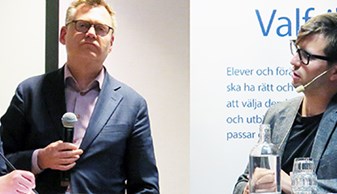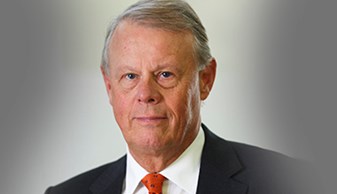News
New report on the integration of immigrants into the Nordic labor markets
Lars Calmfors, IFN, is the main author of a new report written for the Nordic Council of Ministers: Integrating immigrants into the Nordic Labour Markets: An Overall Perspective. The report was presented on Wednesday in Oslo. Per Skedinger, IFN, and Simon Ek, Uppsala University and affiliate to IFN, have written a chapter titled "Wage Policy”. The report shows that subsidized private employment is of most advantage, even for immigrants to, later on, get non-subsidized jobs, Lars Calmfors explained in Oslo. He stated that this kind of support is most common in Sweden of the Nordi9c states. He advised other countries to increase the use of this type of intervention.

Deep dive into knowledge - about education
On Tuesday, the book Glädjeparadoxen – historien om skolans uppgång, fall och möjliga upprättelse (The Happiness Paradox - the story of the school's rise, fall, and possible recovery) (Dialogos Förlag 2019) was presented at a seminar in Stockholm. One of the book's two authors, Gabriel Heller Sahlgren, London School of Economics and IFN, explained that we must take the conflict between joy and effective learning seriously. Magnus Henrekson, IFN, who initiated and closed the seminar, said that the education system we have today is a perfect recipe for increasing the inequality in society and if increased polarization is what we want, we can just continue to build on the current school system.

Boyan Jovanovic received the Global Award for Entrepreneurship Research
On Thursday, Boyan Jovanovic, this year's winner of the Global Award for Entrepreneurship Research, received his award at a ceremony at the Royal Swedish Academy of Engineering Sciences (IVA). The award was handed over by the Minister for Business, Industry and Innovation, Ibrahim Baylan, together with Jan-Olof Jacke, Director General of the Confederation of Swedish Enterprise. Read more about this year's winner on the website of the prize.

Apparent conflict of aims in the education system
“What is meant by high-quality education?” That was the theme of a conference organized by the Swedish Association of Independent Schools. Gabriel Heller Sahlgren, London School of Economics and IFN, discussed the importance of understanding goal incongruence among the many quality-based goals in the education system. For example to increase student influence. Sahlgren presented research showing that student influence is positively correlated with perceived happiness among students. On the other hand, student influence is negatively correlated with economic growth on a national level.

Per Skedinger appointed expert in new committe on labor law
The Government has appointed Gudmund Toijer to a one person committee to propose a modernization of the labor law. The appointment and design of the directives are based on the January agreement between the Social Democrats, the Center Party, the Liberals, and the Green Party. Per Skedinger, IFN, has been appointed an expert in the inquiry. His research has, among other things, focused on the employment protection legislation (Las) and its seniority rules. Other experts are Oscar Norström Skans, Uppsala University, and Anna Breman, chief economist Swedbank.

IFN's research spans a wide field
IFN has on several occasions invited representatives of the Confederation of Swedish Enterprise member organizations to present the institute's broad field of research. "IFN's research and its importance in the public debate" (Magnus Henrekson), "Privatization of welfare services" (Henrik Jordahl) and "Is the Swedish business sector more entrepreneurial than the American?" (Lars Persson), were subjects for the presentations that the participants to listened to. Mårten Blix, IFN, also told about a book that he writes with Henrik Jordahl about the Swedish welfare sector.

Happy Easter!
Happy Easter to all the visitors to this website.

Discussing industry, entrepreneurship and the labor market
At the end of March, the industry-, labor market- and entrepreneurship-group (FAME) at IFN organized an internal workshop for IFN researchers and affiliates. During the workshop, research conducted with IFN's company data and Swedish registry data was presented and discussed. The purpose of the meeting was to review informally, in a small group and to discuss research ideas and ongoing research that are still at a very early stage, and thereby utilize the broad knowledge available at the institute and find possible new synergies. A total of 16 researchers presented and received feedback on their research and their research ideas. Discussing

Retail: the difference between urban and rural areas is increasing
On Friday, Özge Öner, IFN, presented the results of three years of research on the importance of retail for urban and rural areas. The title of the research project is "Shopping for change: The role of retail for urban and rural development in Sweden". The research has been financed by the Handelsrådet (Trade Council). "The industry's size corresponds to almost 20 percent of the total number of jobs and almost 11 percent of GDP", writes Özge Öner in a summary of the project. But despite this, retailing in most Swedish municipalities is decreasing.

A European perspective on the nation state
"As a first big step to saving cohesion within the EU, national politicians must learn to give recognition to the EU for success and not, as the moment itself takes the credit and then blame all the hard-earned decisions on the EU," summarizes the debate on the EU book, Oxelheim summarizes the debate and the return of the nation-state (the 22nd year of Europaperspektiv) on Wednesday was discussed in Brussels. This took place at the Swedish Permanent Representation to the EU with the participation of, among others, trade commissioner Cecilia Malmström.

Research shows that patients want better accessibility and continuity
Research by Petra Persson, Stanford University and IFN, Maria Polyakova and Yiqun Chen, also active at Stanford, shows that people with access to informal health expertise through a family member who works as a doctor or nurse are 10 percent more likely to become 80 years or older. They are also significantly less likely to have chronic lifestyle-related diseases such as heart attacks, heart failure, and diabetes. The study has been published by the National Bureau of Economic Research and also as a working paper at IFN.

Visiting researcher: A way to exchange ideas
Over the years many guests have visited IFN and spent some time at the Institute. This is a way to exchange ideas with researchers working in other countries and to collaborate on projects. Ludek Kouba is a visitor of IFN during spring and summer of 2019. He is an associate professor at the Department of Economics at Mendel University in Brno in the Czech Republic. Also, Kouba has a part-time engagement at the University of Economics in Prague where he gives lectures on institutional economics.

To cope with a crises: Don't copy the past or other countries!
“What I believe is missing in Italy is not the reforms, but believing in the reforms”, said Guiseppe Bertola, University of Turin, when presenting this years' EEAG Report on a seminar in Stockholm. He added that "the solution is not to do the reforms that Germany is doing, it’s not to become Danish and it’s not to do what you did when the country did well. The solution is to understand the surrounding”. Karolina Ekholm, professor in international economics, and Mauro Gozzo, chairman of the Economic Council of Swedish Industry, commented on the report. "Sweden is seen as one of the good guys, and I do not like this narrative since it divides up Europe into south and north,” explained Ekholm. Mauro Gozzo agreed.

Global Award 2019 goes to Boyan Jovanovic
The 2019 Global Award for Entrepreneurship Research goes to Boyan Jovanovic, Professor of Economics, New York University. Jovanovic is awarded for his pioneering research on the competitive dynamics between incumbent firms and new ventures, entrepreneurial learning and selection processes. The Global Award is the foremost international award in entrepreneurship research with a prize sum of € 100,000.

Now you can download highly acclaimed book about Swedish education
Finally, you might say, the highly acclaimed book Kunskapssynen och pedagogiken (Knowledge and the pedagogy) (Dialogos Bokförlag) can be downloaded online. The book, with Professor Magnus Henrekson as editor, was launched in 2017 and Magnus Henrekson has since that time presented it at numerous seminars, conferences, and meetings. The most common reaction has been, he says, either that "you explain something I knew but wasn't able to put words on" or skepticism and surprise, people saying that "this can't be true, it is far from common sense and is not logical."

How hate spreads online
On Monday, Joakim Jansson, Linnaeus University and affiliated with IFN, presented research on hatred online, at a brown bag seminar at IFN. Jansson, together with Emma von Essen, is researching the connection between anonymity and hate towards feminists and foreigners spread online. They find that when anonymity is weakened, the hate generally subsides, including hatred towards foreigners.

Myrdal Prize awarded to Erik Prawitz

Staffan Bohman, new chairman of the board
Staffan Bohman will be the new chairman of the board of the Research Institute of Industrial Economics, IFN. He succeeds Michael Treschow, who has been chairman 2011–2018.

Open House attracted many students
In early February IFN invited PhD students and students in their final year of the master program in economics to an Open House. The students came from Uppsala University, Stockholm School of Economics, Stockholm University, Jönköping International Business School, University of Gothenburg and Lund University. Following a number of presentations of the Institute and research projects the students mingled with researchers and research assistants learing more about what it's like to be a researcher.

Parliamentary committee interested in research on digitalization
On Tuesday, Mårten Blix, IFN, presented research on digitalization in healthcare to the Committee on Social Insurance in Swedish Parliament. Blix, together with Allan Gustafsson, was invited to talk about their findings and to answer the members' questions. Both Blix and Gustafsson are authors of a ESO reports on digitalization within healthcare.

